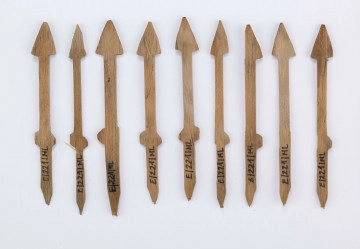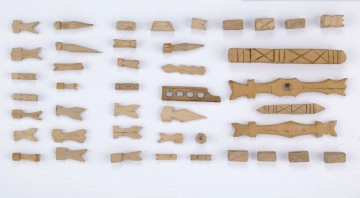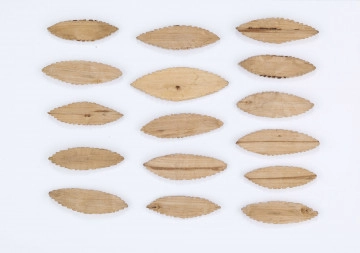
Game `Pick-up Sticks`
1901 — 1920
National Museum in Lublin
Part of the collection: Folk craft of the Lublin Region (19th/20th c.)
Rural children received toys far less frequently than those living in towns. As a rule, they did not buy them. This was due on the one hand to the difficult material situation, and on the other to the conviction that a child, when grown up, should help on the farm and not waste time playing. Sometimes, at church fairs or small-town fairs and markets, parents bought clay figurines and whistles in the shape of animals (see E/1649/ML) or dolls (see E/544/ML). More often, children made trinkets for play by themselves, with the help of adults. The most common ones included rag dolls, balls made from rags or cow hair, and wooden toys – people, boats, windmills, pipes and pipes, lawn mills (see E/2146/ML) or pecking hens (see E/17030/ML). The imagination was so rich in ideas and so inspiring that a child was able to conjure up whatever he/she wanted from any object he/she encountered. Thanks to it, a simple stick or branch could become a full-blooded steed, bayonet, sword or rifle, and pieces of wood cut appropriately became figures for exciting games (see: E/217/ML, E/220/ML).
While playing, children moved into a world known only to them. Girls imitated their mothers by taking care of a baby doll, preparing quasi-dinners and cleaning. On the other hand, just like today, boys loved to play fearless heroes and conquerors of evil. They were also occupied with imaginary warfare. They used crossbows or bows with wooden arrows, slingshots made from forked twigs or pistols constructed from pieces of wood, often using real cartridge casings from firearms.
Author / creator
Dimensions
cały obiekt: height: 12,5 cm
Object type
toy
Technique
own technique
Material
wood, copper, brass
Creation time / dating
Creation / finding place
Owner
The National Museum in Lublin
Identification number
Location / status

unknown
1901 — 1920
National Museum in Lublin

unknown
1901 — 1920
National Museum in Lublin

unknown
1901 — 1920
National Museum in Lublin
DISCOVER this TOPIC
National Museum in Lublin
DISCOVER this PATH
Educational path
0/500

We use cookies to make it easier for you to use our website and for statistical purposes. You can manage cookies by changing the settings of your web browser. More information in the Privacy Policy.
We use cookies to make it easier for you to use our website and for statistical purposes. You can manage cookies by changing the settings of your web browser. More information in the Privacy Policy.
Manage cookies:
This type of cookies is necessary for the website to function. You can change your browser settings to block them, but then the website will not work properly.
WYMAGANE
They are used to measure user engagement and generate statistics about the website to better understand how it is used. If you block this type of cookies, we will not be able to collect information about the use of the website and we will not be able to monitor its performance.